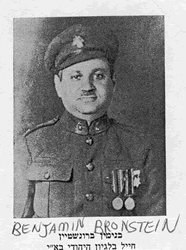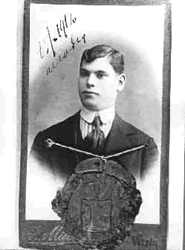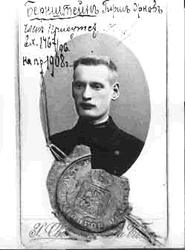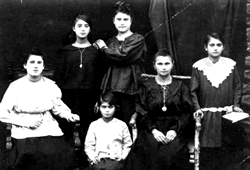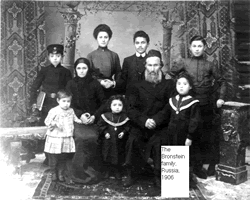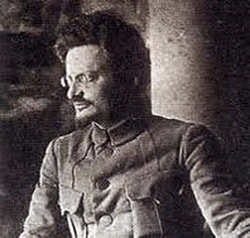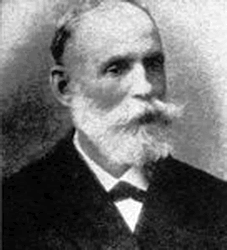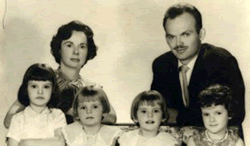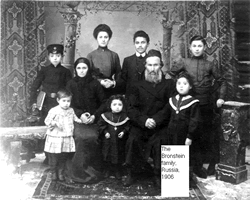Benjamin Bronstein was a native of Vilejka. During World War I he joined The Jewish Legion.
The Jewish Legion was a military formation of Jewish volunteers in World
War I, who fought in the British Army for the liberation of Eretz Yisrael
from Turkish rule. The idea was raised, on December 1914, by Vladimir
Jabotinsky and was fully embraced by Yosef Trumpeldor. By the end of March
1915, 500 Jewish vounteers from among the yishuv deportees in Egypt had
started training. British military command opposed the participation of
Jewish volunteers on the Palestinian front and suggested the volunteers
serve as a detachment for mule transport on some other sector of the Turkish
front. Trumpeldor succeeded in forming the 650-strong Zion Mule Corps,
of whom 562 were sent to the Gallipoli front. Meanwhile, Vladimir Jabotinsky
pursued his project of a Jewish Legion for the Palestinian front. Finally,
on August 1917, the formation of a Jewish regiment was officially announced.
The unit was designated as the 38th Battalion of the Royal Fusiliers.
It included British volunteers, members of the former Zion Mule Corps
and a large number of Russian Jews. On April 1918 it was joined by the
39th Battalion of the Royal Fusiliers, over 50% of whom were American
volunteers. In June 1918, these battalions were sent to Palestine, where
the volunteers fought {under the command of General Allenby} for the liberation
of Eretz Yisrael from Turkish rule. The Jewish Legion was demobilized
by the anti-Zionist British Military Administration, 1919-1920.
#brst-4:Sorke nee Bronstein with daughters.
My aunt Sorke (Sarah) nee
Bronstein was married to Mendel Zavodnick and lived in Brooklyn, NY.
She had 6 daughters and no sons. They tried but no luck. The daughter's
names are: Jeannette, Adele, Rose, Beatrice, Ella and Tillie. I am married
to Jeannette's daughter, Florence (another Fayge). I had a brother,
Herman (another Chaim) and sister Floris (another Fayge).
I'll be happy to give you more info on the Bronstein's and the Zavodnicks
if you'd like.
Sincerely.
Ken Bronstein
#brst-6
From: sergio robinovich
Date: Thu, Oct 22, 2015 at 8:05 PM
Subject Bronstein Family
To: eilat gordin <egl.comments@gmail.com>
Hi, my family Bronstein was from Ekaterinoslav. My aunts say they were related to Trotsky. I have tracked the link and I concluded that the father of Trostky, David – was brother of my great-great grand father Benjamin.
I know that my great grand mother Clara was cousin of Trostky. On her gravestone is written Keila bat Biniamin …
So I want to know if anyone has the complete list of the David´s siblings and from which Bronstein family is the picture of the site http://www.eilatgordinlevitan.com/kurenets/k_pages/bronstein.html (BRST 5 to 10).
Thanks,
Sergio.
Leon Lev Davidovich Trotsky (Bronshtein)MP
Birth:
November 7, 1879
Yanovka, Russia
Death:
August 21, 1940 (60)
Puesto Central de Socorro de la Cruz Verde, Mexico City, DF, Mexico (Assassinated)
Immediate Family:
Son of David Leontyevich Bronstein and Anna Lev Bronstein
Husband of Natalia Sedova
Ex-husband of Aleksandra Lvovna Sokolovskaya
Father of Zinaida Volkova; Nina L'vovna Nevelson; Lev Sedov and Sergei Sedov
Brother of Elizaveta Davidovna Bronstein;Aleksandr Davidovich Bronshtein; and Clara Bronstein
#brst-7
From: sergio robinovich
Date: Thu, Oct 22, 2015 at 8:05 PM
Subject Bronstein Family
To: eilat gordin <egl.comments@gmail.com>
Hi, my family Bronstein was from Ekaterinoslav. My aunts say they were related to Trotsky. I have tracked the link and I concluded that the father of Trostky, David – was brother of my great-great grand father Benjamin.
I know that my great grand mother Clara was cousin of Trostky. On her gravestone is written Keila bat Biniamin …
So I want to know if anyone has the complete list of the David´s siblings and from which Bronstein family is the picture of the site http://www.eilatgordinlevitan.com/kurenets/k_pages/bronstein.html (BRST 5 to 10).
Thanks,
Sergio.
David Leontyevich Bronstein
Birth:
1847
Poltava, Poltavs'ka oblast, Ukraine
Death:
March 1922 (75)
Moscow, gorod Moskva, Moscow, Russia (typhus)
Immediate Family:
Son of Leon Bronshtein
Husband of Anna Lev Bronstein
Father of Elizaveta Davidovna Bronstein; Aleksandr Davidovich Bronshtein; Leon Bronshtein (Lev Davidovich Trotsky); and Clara Bronstein
Half brother of Grigory (Gersh) Bronshtein; Mikhail Bronshtein and Olga Bronshtein
2<sergiorobinovich@hotmail.com>
........
David Leontyevich Bronstein ( Trotsky's father from the tree on Geni)
son of Leon Bronshtein
Husband of Anna Lev Bronstein
Father of Aleksandr ; Elizaveta; Leon (Lev Trotsky);
????? ????????? ????????; Clara Bronstein and Antonia Szmuk
( only 4 survived to adult age)
Brother of Grigory (Gersh) ; Mikhail ; Olga ; Israel ;
Regalin; Shepsa Shmit; Rabinowitz
#brst-8:
-- https://litci.org/en/traces-of-trotsky/
The grandson and great-granddaughters of the assassinated revolutionary leader, survivors of the family extermination, have followed important scientific and artistic careers in Mexico and the United States.
By Paul de Llano – El País.
On a sunny morning, Esteban Volkov looks at the junk piled in the courtyard of his house, and identifies the pieces that years ago composed his laboratory of chemicals waste recycling. Glass pipes and steel. Bomb of void. Pressure gauges. Propellers. Valves. Stirrers. “And this ball…“, he says lifting a rusty soil sphere, “What the hell is this?“, and drops it. Business worked well for a long time, but in the end it was neglected and broke. “I was not interested in becoming a prosperous capitalist“, he laughs, and although the grandson of Trotsky lost his mother tongue as a child, his laughter sounds in Russian.
When in 1926 his grandfather called Stalin “gravedigger of the revolution“, he predicted that the vindictive dictator of the Soviet Union would not only kill him, but would also pursue his line. His mother, Zinaida, Trotsky’s daughter, sick with tuberculosis, committed suicide in Berlin by leaving the cooking gas open. His father, Plato, was shot. His uncle Leon, Trotsky’s son and right hand, died raving at a clinic in Paris, allegedly poisoned. His uncle Sergei was shot. His great-uncle Aleksandr was shot. His great-aunt Olga was shot. His grandmother Aleksandra, first wife of his grandfather, was shot. And of course, the grandfather, the founder of the Red Army, the ideologist of the world revolution, Lev Davidovich Bronstein himself, Leon Trotsky, was killed in 1940 with an ice ax blow to the head.
Esteban Volkov is the direct survivor of a family extermination. He was there when they killed his grandfather in the house of Mexico City, where they lived in exile. And in that same house, before moving, in the seventies, to where he lives now, he raised his four daughters, who are proof that Trotsky’s powerful brain survived, through its DNA. The twins Patricia and Natalia Volkov, the youngest, are now a well-known infectious disease expert, and the systems’ chief engineer of the Statistical Institute of Mexico. The second one, Nora, is Director of the National Research Center on Drugs, in the U.S. The eldest daughter, Veronica, is a poet and scholar. They exist, among other things, because his father had a narrow escape in the first of the two attacks to Trotsky, in Mexico. “I think my dad learned from Trotsky discipline, conviction and another extraordinary feature of my great-grandfather: resilience“, says Nora Volkov an afternoon from Washington, after presenting a report in the US Congress, on a day that started half past four in the morning in order to do her daily workout session. “My dad’s life as a child was the most stressful, and despite all these tragedies we see a man of emotional integrity, and very motivated, at 90 years old“.
Born in Yalta, Ukraine, in 1926, his original name was Vsevolod. At the age of five he left Moscow with his mother to the Turkish island of Prinkipo, first refuge of Trotsky. In 1932, mother and son move to Berlin, where the Nazi party begins to swallow the power. A few weeks later she commits suicide. He spends a year and a half in a boarding school in Vienna, led by disciples of Sigmund Freud, and in 1934 he is sent to Paris to live with his uncle Leon Sedov. In 1939, after the terrible death of Leon, Trotsky orders to send him to Mexico and name him Esteban. Now Esteban Volkov, lying on his couch in a youthful posture, almost a century after his grandfather and Lenin led the revolution, answers the question by ideology: “What can I tell you? Well, definitely, capitalism is not working. Trotsky’s grandson is the executor of his memory rather than his doctrine. I have always been away from politics. My role has been to bear witness to what I experienced. The fierce persecution my family suffered, the avalanche of lies and monstrous falsehoods“. Trotsky did not want to make him part of his business. In fact, he rebuked his guards if they did so: “Do not talk about politics with my grandson“, he ordered.
Trotsky's grandson recalls ice pick killing
By Mike Lanchin BBC World Service
? 28 August 2012Speaking slowly, careful not to leave out any detail, Volkov recounts how he was walking home from school when he first noticed that the door of the house was open and a police car was stationed outside. Filled with trepidation he rushed into the house, to find the guards in disarray. Before being shooed away, Volkov caught sight of his grandfather, lying on the floor of his study, bleeding profusely. Natalia was at his side. "Don't let the boy see this," Trotsky is reported to have told her. He died the next day in hospital.
The young boy was so distraught he refused to go to his grandfather's funeral. "It was a very, very lonely atmosphere in the house after that."
Following Trotsky's death, Volkov continued living in Mexico with his grandmother. He went to university, trained as a chemist, married and raised four daughters of his own - a great comfort to Natalia as she mourned her murdered husband.
Natalia died in January 1962. Volkov, himself now a widower, has turned the old family house into a museum. It was, he says, his "duty" to honour the memory of his grandfather.
Esteban Volkov was talking to Witness on the BBC World Service
#brst-9:
I do not recall how I got the picture many years ago. Most likely the
young children are nephews of Trotsky since his mother was born
in 1850 and in the picture she should be 56. I will try to find
#brst-10:
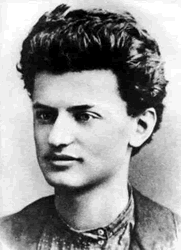 Originally named Lev Davidovich Bronstein, Trotsky was born on November 7, 1879, in Kherson Province in Ukraine, the son of Russified Jews. He was educated in Odesa and in Mykolayiv and was a star pupil with enormous intellectual capabilities.
Originally named Lev Davidovich Bronstein, Trotsky was born on November 7, 1879, in Kherson Province in Ukraine, the son of Russified Jews. He was educated in Odesa and in Mykolayiv and was a star pupil with enormous intellectual capabilities.
Trotsky's political involvement began in 1896 in a circle of Mykolayiv Populists, but he soon converted to Marxism. After a brief stay at Odessa University, he returned to Mykolayiv in 1897 to organize the Southern Russian Workers Union. For this he was arrested, jailed, and exiled.
He escaped from Siberian exile in 1902, fleeing to Europe and adopting the pseudonym Trotsky. Abroad he joined Lenin, L. Martov, Georgy Plekhanov, and other Russian Social-Democrats, who were publishing Iskra (The Spark). By vitue of his flair for polemic writing and oratorical brilliance, he quickly rose in the party.
At the party's Second Congress in 1903 Trotsky opposed Lenin and the Bolsheviks, siding with the Mensheviks. His characteristic independence, however, kept him from cementing any organizational ties. Alone of the major party leaders, he rushed back to Russia to be an active participant in the 1905 Revolution, where he gained practical experience as chairman of the Saint Petersburg Soviet of Workers Deputies. Jailed in December 1905 and later exiled to Siberia, Trotsky used his time to reconsider the paradoxes of revolution in backward Russia. He synthesized his thoughts in two books, 1905 and Results and Prospects.
Escaping from Siberia in 1907, Trotsky spent the next decade defending his ideas and engaging in émigré squabbling. The March Revolution of 1917 caught him by surprise in New York City, where he wrote for a Russian newspaper. Trotsky reached Russia in May, quickly assumed leadership of the independent left Social-Democratic Interdistrict Group, and joined the Petrograd (as St. Petersburg was renamed) Soviet. Within weeks, he had gained enormous popularity as the most eloquent agitator of the Soviet left. In July, after being courted by Lenin, he joined the Bolshevik party and was elected to its Central Committee.
As a Bolshevik, Trotsky was elected chairman of the Soviet in September. He sided with Lenin on the need to overthrow the provisional government and devoted all his energies to marshaling support for the armed uprising of the Bolsheviks. With Lenin in hiding, Trotsky was the general in charge, and he successfully directed the masses of workers and soldiers in the November revolution.
In the ensuing Soviet government Trotsky first became commissar of foreign affairs, negotiating a separate peace with Germany at Brest-Litovsk. Later, as a ruthlessly practical commissar of war, he is credited with creating, inspiring, and directing the Red Army that gained a great victory in the civil war and saved the Revolution.
Trotsky was second only to Lenin in the Politburo, and Lenin viewed him as exceptionally able. He backed Lenin's major policy innovations, but had his own plans for industrializing Russia. When a stroke removed Lenin from active politics in May 1922, Trotsky was not in a position to take over. Never particularly adept at party politics, he failed to outmaneuver the troika of Grigory Zinovyev, Lev Kamenev, and Stalin that took power. Although he put himself at the head of a loosely knit left opposition, Trotsky's polemic salvos were no match for Stalin's bureaucratic party machine. In 1925 his adversaries removed him from the Commissariat of War; in 1926 they expelled him from the Politburo; and in 1928 Stalin exiled him to Central Asia and in 1929 expelled him from the USSR.
From: broustine@aol.com <broustine@aol.com>
Hello
On website horodok (eilatgordinlevitan.com), there is a page about BRONSTEIN family
There is a boy middle of the photo, who is perhaps my grand father! (photo of bronstein family)
Have you others details about this family?
Have you the phone number of the person living in New York who's name is SORKE (photo on right of the page)
She said that she can help too.
Thank you if you can answer this mail
bernard broustine
From: Lisa Altshuler <lisa.altshuler@ucsb.edu>
Date: Wed, Mar 8, 2017 at 8:57 PM
Subject: Bronstein
To: egl.comments@gmail.com
Hello,
I have been helping my husband research his family and we have recently stumbled upon information that we were unaware of. My husband's grandmother has on occasion mentioned that she has an uncle named Leon Trotsky. My husband's grandmother was an only child, her birth name was Sarah Bronstein (changed to Sonia Myronoff), mother's name Rachil Bronstein. Her father came to the US in 1922, his name was Boris Bronstein. He changed his name in the US to Boris B. Myronoff, official in 1926, as well as the names of his wife and daughter. He was a pianist and composer both in Russia and the US. Boris has a birthdate of Oct 3 or Oct 17, 1889. He lived in Brooklyn NY when he arrived in the US, possibly with a sister named Fannie. He moved to Los Angeles where he lived the rest of his life, dying in 1976 in a car accident. We are wondering if there is any additional information available on Boris or his possible relationship to Leon Trotsky? My husbands Grandmother and great grandfather did not speak of their life in Russia often and diverted most conversations.
Thanks for any information that you may have.
--
Lisa C. Altshuler
